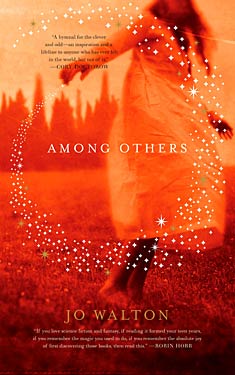Jo Walton
Completed 5/17/2013, reviewed 5/24/2013
4 stars
It’s great that a Hugo winner is a book about a science
fiction fan. The attraction
to science fiction, for many of us, begins when we’re young, feeling outcast, different,
or otherwise disenfranchised from the mainstream. We find it a solace, a place where we can
believe that there’s something else out there, something better, something more
real than our cruel reality. The main
character of this story is one of these fans, a teenage girl whose turns to SF
to escape from the cruelty and craziness in her life.
Morwenna has a crazy, abusive mother from whom she’s
escaped, an alcoholic father who she’s just met, and goes to a private boarding
school where, of course, she doesn’t fit in.
She is also the surviving twin of a car crash caused by her mother. However, she finds her peace in SF, and has
read an unbelievable amount of SF and fantasy, mostly by some of the most
esteemed and prolific authors. To her
joy, she also finds an SF book club at her local library. She gets to do a little growing up through
new relationships she forms with the members of the club as well as with other
book lovers.
One other thing, Mori can do magic and can talk to the
faeries. She spends most of her time
protecting herself against the bad magic of her mother. She is originally from Wales where she
often spoke with faeries. Now living
with her father in England ,
she can see them, but doesn’t have much interaction with them.
Mori’s story is told through a diary. The format made it easy to read as well as
immediate and profound. It follows her
through the meeting of her father to the final confrontation with her
mother.
I loved almost every aspect of this book. While the plot is linear, it does not really
develop like a standard novel. Some
things happen out of the blue. The
ending, for example, doesn’t have any real build-up. It simply happens. But that was okay for me. I like the fact that we were learning about
Mori as she reveals herself to us in a non-formulaic way.
The magic was interesting too. It was more akin to magical realism than a
“normal” fantasy containing magic. I
liked that as well. It wasn’t constantly
fantastical. It was simply part of her
everyday life.
There was only one part of the story that bothered me. Her father, in a drunken stupor, tries to
climb into bed with her and kiss her. It
seemed extremely out of context. Sure
the father is an alcoholic, meeting her for the first time since she was an
infant, and struggling with having a relationship with her. But what point does the scene make? None.
There’s no further mention of it, no repercussions, no tension. It just happens, and then it disappears. To me, it was totally unnecessary. I think the uneasiness I felt because of it
prevented me from having a more profound experience with the book. Without it, I think I could have given this
book 5 stars, a rating I only give to books which profoundly move me.
I loved the insipid step-aunts, who bear some resemblance to
Hamlet’s wyrd trio of witches. I also
liked the development of her relationship with a boy from her book club. It came across as real, and not
melodramatic. I also liked her portrayal
of the librarians. They are the modern
stereotype of librarians: book lovers
who have a better understanding of the world, who can see life through eyes
different than most adults, because their minds are expanded by the books they
treasure, and can see into the soul and needs of their patrons.
I gave the book 4 stars because, despite the incest scene,
the story is awesome, the characters are wonderfully developed, and I felt like
I really got to live inside Mori’s skin for a while.

No comments:
Post a Comment